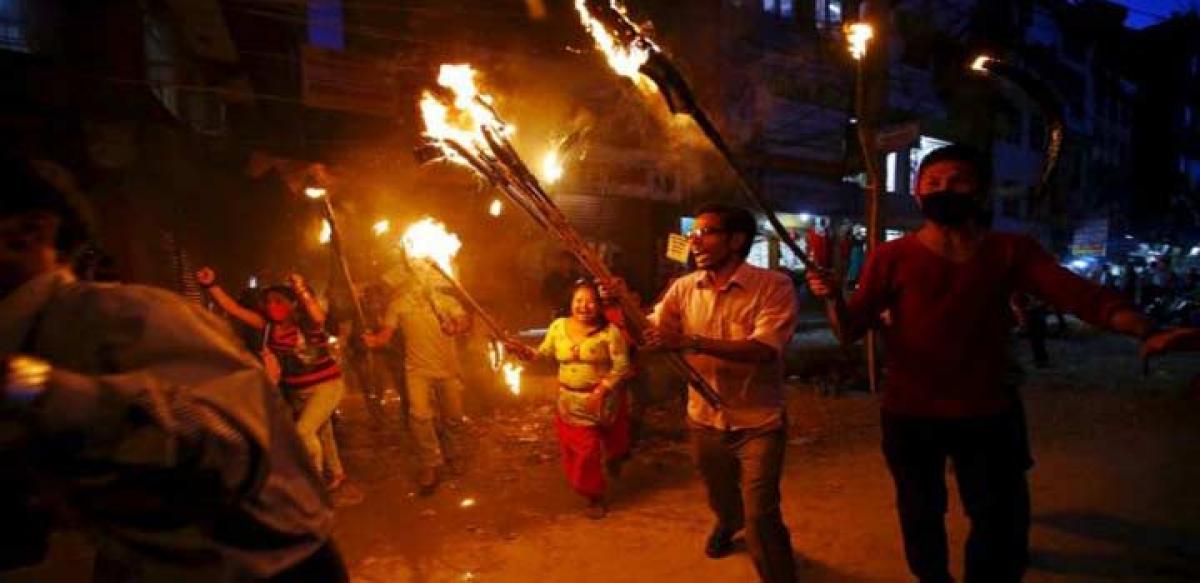Live
- Chanchalguda Jail Officials Say They Haven't Received Bail Papers Yet, Allu Arjun May Stay in Jail Tonight
- BJP leaders present evidence of illegal voters in Delhi, urge EC for swift action
- Exams will not be cancelled: BPSC chairman
- Nagesh Trophy: Karnataka, T.N win in Group A; Bihar, Rajasthan triumph in Group B
- YS Jagan condemns the arrest of Allu Arjun
- Economic and digital corridors to maritime connectivity, India and Italy building vision for future, says Italian Ambassador
- SMAT 2024: Patidar's heroics guide Madhya Pradesh to final after 13 years
- CCPA issues notices to 17 entities for violating direct selling rules
- Mamata expresses satisfaction over speedy conviction in minor girl rape-murder case
- Transparent Survey Process for Indiramma Housing Scheme Directed by District Collector
Just In

Will new Constitution boost or stifle Indo-Nepalese ties. Nepal adopted a new constitution on September 20 aimed at bolstering its transformation from a Hindu monarchy to a secular democracy, as violent protests raged against some of the terms of the charter.
Nepal adopted a new constitution on September 20 aimed at bolstering its transformation from a Hindu monarchy to a secular democracy, as violent protests raged against some of the terms of the charter.
.jpg)
The new constitution is the final stage in a peace process that began when the Maoists laid down their arms in 2006 after a decade-long civil war with the state and turned to politics, winning parliamentary elections two years later and abolishing the monarchy.
"I announce the presented constitution of Nepal, passed by the Constituent Assembly and authenticated by the chairman of the Constituent Assembly, effective from today, 20 September 2015, before the people of Nepal," said President Ram Baran Yadav.
Members of the parliament approved the charter on Wednesday despite weeks of violent protests against plans to divide the Himalayan nation of 28 million people into seven provinces. More than 40 people have been killed in clashes between protesters and police CNN observes that Nepalese speak over 100 languages.
They're split by divisions such as high- and low-caste, Nepali-speaking v speakers of indigenous languages, hill ethnicities v lowland ethnicities, and gender divisions, with high-caste men from the hills almost supremely dominant up to now.
The new document has drawn up provisional boundaries for seven states but their names are to be decided by their eventual assemblies and a commission has yet to fix their final boundaries. Nepali society has become deeply polarised on whether the states should be ethnically delineated.
But some ethnic groups say the division leaves them underrepresented in parliament. They include the Madhesi and Tharu ethnic minorities, who mainly live in the southern plains along the border with India. The Madhesi and Tharu mainly live in the southernmost part of Nepal, an area known as Terai.
Terai accounts for about a fifth of Nepal's land area but is home to slightly more than half of its population, with the two ethnic groups making up just over a quarter of this. Their main demand: representation equal to their population and federal redistricting that maintains Madhesh and Tharu provinces – which would guarantee the groups a bigger representation in parliament.
"The protesting parties see the current design of federal demarcation plan in the new constitution as a way to minimize their demographic power, and lessen their political bargaining capacity," said Dipendra Jha, a lawyer at the Supreme Court and a Madhesi practicing in Kathmandu. "This is gerrymandering."
Those in favor of the new constitution disagree, describing the outcome as the result of democratic process that all parties must learn to accept. They contend that the new constitution can be amended in the future, and the government has called for dialogue to appeal multiple times, but the Madhesi and Tharu representatives say the government hasn't created a suitable environment for talks.
India has expressed concern at the violence, which has seen some parts of southern Nepal shut down for weeks. Beyond the Indian government’s immediate concerns, however, some Nepalis see an unwelcome pattern of meddling by India in their affairs, observes Christian Monitor.
It cites an observation by The Wall Street Journal: “India often plays a big brother role, one that is not often appreciated by many Nepalis.” After centuries of interwoven history, India finds it hard to shake an “interventionist mindset.”
In fact, it helped Nepali parties broker their agreement with Maoist rebels that abolished the monarchy in the first place. In the latest round of constitutional talks, CNN-IBN reports that Indian Prime Minister Modi sought special assurance that the Madhesi’s concerns would be taken into account.

© 2024 Hyderabad Media House Limited/The Hans India. All rights reserved. Powered by hocalwire.com







